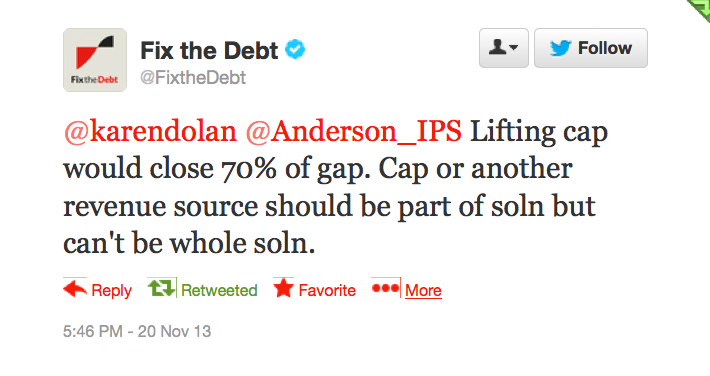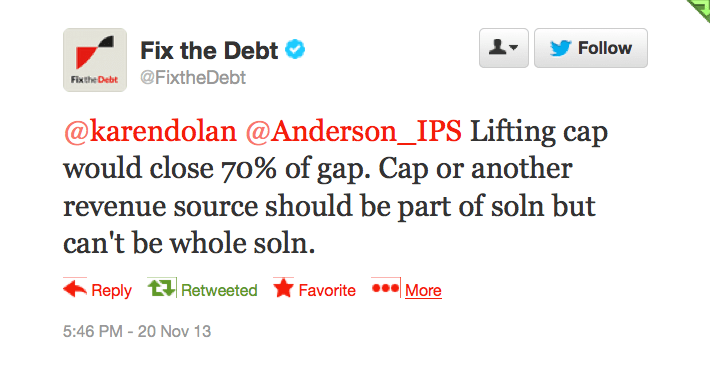(Source: @FixTheDebt)
Austerity has always been a political choice, not a practical one.
That point was underscored yet again when the Institute for Policy Studies (IPS) released a report on the pensions enjoyed by backers of Fix The Debt, a corporate-funded austerity advocacy.
| The tax that funds Social Security stops at $113,700 of annual income. Fix the Debt, the leading advocate for Social Security cuts, now says lifting the cap would cover 70 percent of shortfalls. It’s more like 95 percent. |
The report describes how key players in this group—who are among the wealthiest and most vocal advocates of “entitlement reform”—themselves enjoy so-called “Platinum-Plated Pensions“: hundreds of millions in guaranteed retirement income supported in no small part by federal and state tax breaks as well as explicit government subsidies. IPS’s message was clear:
Austerity is a choice that Fix The Debt wants to have made, but only for the rest of us.
Fix The Debt took to Twitter to respond to the report, sending copies of a rather vacuous press release to anyone talking about the IPS report. This did the group no favors. Instead, the effort inspired more vitriol than it quelled. The most telling moment came when Twitter commentators pointed out that lifting the income cap on Social Security tax—currently, the payroll tax that funds Social Security is levied only on the first $113,700 of income, leaving billions on the table each year—would dramatically expand the revenue base for the program for decades.
@FixTheDebt responded that this measure would “would close 70% of gap. Cap or another revenue source should be part of [solution] but can’t be whole [solution].”
Setting aside the veracity of their numbers—the nonpartisan Congressional Research Service rated Sen. Mark Beglich’s (D-AK) proposal to eliminate the cap as covering 95 percent of any potential shortfalls through the next century—it’s telling that even Fix The Debt agrees that simply ending Social Security’s quixotic status as one of the few overtly regressive federal taxes would cover the overwhelming majority (if not, as many forecasters estimate, nearly all) of shortfalls.

Instead, they advocate reducing benefits, primarily by raising the retirement age, which would affect 100 percent of the population, rather than extending to a tiny fraction of the population—the wealthy—a tax burden shared by the vast preponderance of workers earning wages that fall far below the cap. Last year’s median wage (half making more, half making less) was $27,519.
Though austerity propaganda is often cast as beholden only to simple arithmetic, a moment of weakness reveals that Fix the Debt’s beliefs are less about math than they are about priorities.
So the question is: whose priorities?
The modern austerity era can in many ways be traced to Ronald Reagan’s 1966 campaign pledge to “clean up” the University of California Berkeley campus. One key tactic in the “clean up” of radicalization-by-education was to impose the first tuition (“fees“) on the previously fully state-funded university system, thus beginning a decades-long spiral that has culminated in today’s UC graduates entering the world saddled with debt and tuition prices rise faster than even medical costs, even though a public option for higher education is eminently affordable.
This was, of course, the intended effect. Tuition increases were a “disciplinary technique.” Students who worry about their debts—at time when employability is threatened by participation in protest—are much less likely to retaliate against a system to which they are so heavily in hock.
The lesson then and now is that austerity initiatives, though they are couched in the language of kitchen-table commonsense, are more often than not thinly-veiled cover for longstanding political goals—scores to settle, ideologies to impose, redistribution of largesse to well-heeled friends.
Now as sequestration begins to take its full toll, the choices being made for us become all the more stark: life-saving food-stamp assistance is being cut for 40 million people, all to save an amount of money less than the Pentagon “misplaces” each week.
So as is always the case in politics, the question is simple: who chooses and who loses?
Austerity is a conscious choice to redistribute wealth from those in need to those with greed. But it is a choice we can choose to unmake. The first step is to stop making the choice again.
Aaron Bornstein is an independent writer living in New York City.



0 Comments